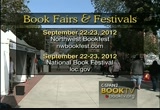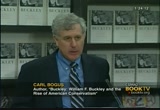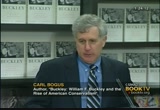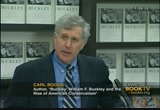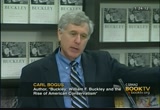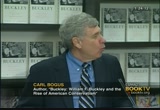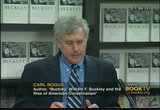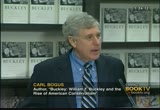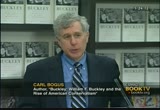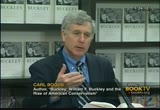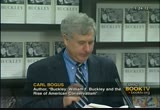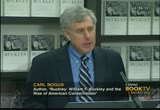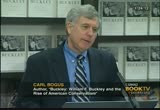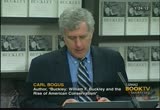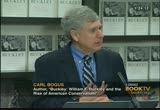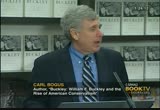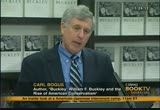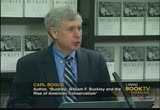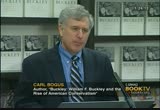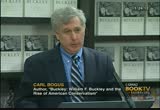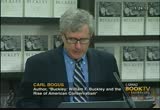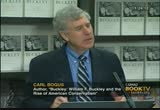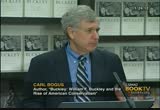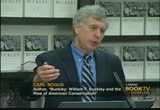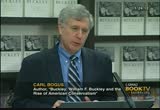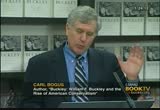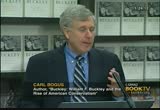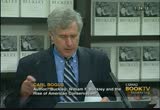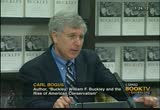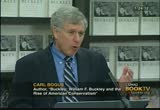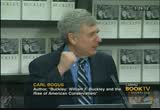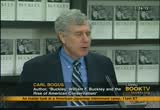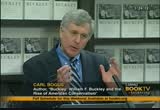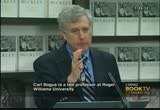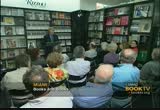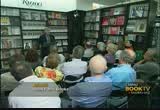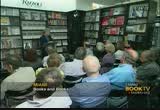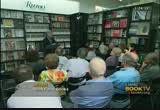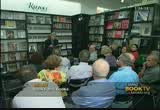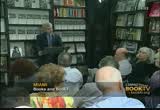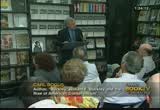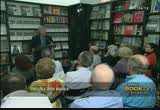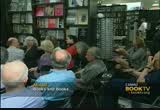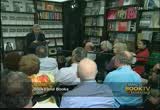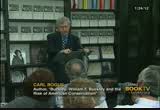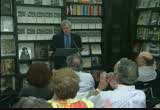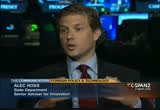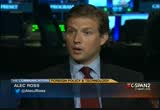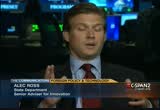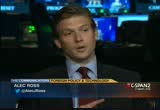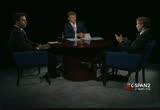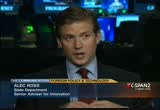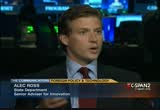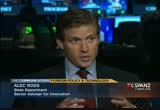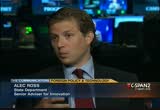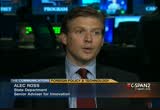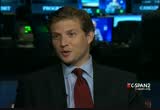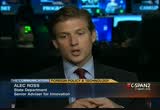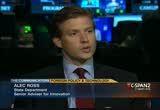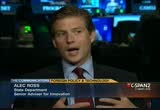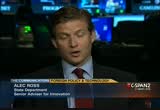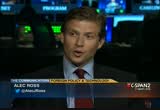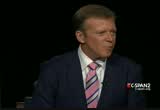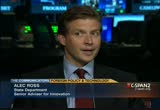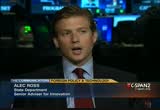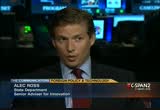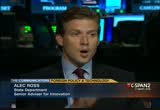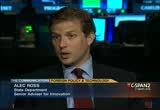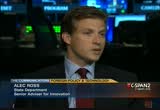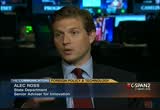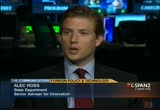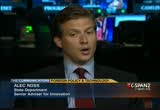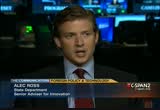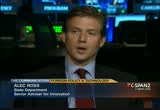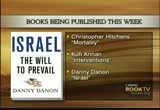tv Book TV CSPAN September 3, 2012 7:15am-8:30am EDT
7:15 am
>> thank you all for coming to books and books and supporting independent bookstores all around. [applause] >> with a very special guest here for you today. he's a professor at roger williams university. ya spoken from congress, and his writings have been published in the nation, "usa today" and "the boston globe." he is here to discuss his latest book, "buckley." please join me in welcoming carl bogus. [applause] >> thank you very much. good evening.
7:16 am
pleasure to talk to you today about william f. buckley, and maybe most speakers don't begin by telling you their political affiliation, but i think that that's important and necessary. i have to be a liberal, and i know i'm speaking about a conservative icon, and the figure who is beloved by millions of people. so i think it's important that i confess my apostasy first to i happen to admire buckley tremendously, and many, many ways, but i also disagree with many of his ideas and that may come through. but i wanted to be up front with you about that. historians debate whether history is made by individuals or by structural forces. if george washington happened to
7:17 am
have lived, or james madison, or abraham lincoln, would united states exist? if it did exist would be the same country we know to be? what other people have, thought, fill the shoes and done what they did, or would things be markedly different? for our purposes tonight, the question is if william f. buckley, jr. had not lived, what conservatism be what it is today or would it be different? would have been a conservative movement? had there been a conservative movement, which it had achieved the same success that it has achieved? i'm going to put that question aside for a moment and try to circle back to it later. let's start with who was
7:18 am
buckley. well, he had six different careers, or he did things that would have been, would have filled careers for six people and made them whole and quite a few successful. let's start with the fact he was a syndicated columnist. he wrote for many, many, many years. in fact, up until he died, a column called on the right. at its height it was published three times a week in 350 newspapers. he was one of the most widely read columnists in the country. he produced in the course of his life 5600 columns. if you just took his newspaper columns and to publish them in book form, they would fill 28 volumes this size. he did this extraordinarily
7:19 am
well. he won the best columnists of the year award in 1967. and so i suggest that if he had just been a syndicated columnist he would've been enormously successful and enormously influential. what he also wrote 56 books. six of those books happen to be collections of magazine articles and speeches, but that leaves still 50 additional books. most were on politics but he wrote about all kinds of other things. he wrote a very successful spicy trees. he wrote about sailing across the ocean. -- spicy trees. -- us by series. in addition to the spokesman of which were national bestsellers to many of them, he published countless magazine articles not only in his own magazine "national review," but and magazines that prides himself on publishing the very best literature that the author an escort and many other magazines, and he did this very well.
7:20 am
he won an award for the best ministry in paperback one year. t-1 pole vault hamas travel journalism award as the best travel article when you. spirit he won the low hamas travel journalism award. >> if you just done that he would've been very successful. he was a public speaker. he was probably the most sought after, certainly one of the most sought after public speakers and attorney. at his site he averaged 70 talks a year. and he did this in large part to raise extra revenue to help support his magazine, "national review." he was a television host of the "firing line." he did this from 1967 until 1999. he still holds the record of -- well, "firing line" holds the
7:21 am
record for being the show, the longest-running show with a single host in history. he did this extremely well. he won in any award for outstanding achievement for his television show. if you just done the television show, for 33 years and been that successful, it would have been an enormous accomplishment. and now i come to his signal accomplishment. he founded "national review" magazine in 1955. he edited it up until 1990. he maintained legal control of it until 1999, and probably many of you know, "national review," biweekly or semimonthly, conservatives journal of opinion, probably the most influential opinion journal in the united states on the left or the right.
7:22 am
and it was a vehicle for defining, redefining conservatism in the '50s, in the '60s, and creating a conservative movement and still, and enormously intellectual magazine. he was, buckley was a man of extraordinary wit and sharp and for those of you who remember him, probably remember this. he had the nice. yet charisma. he did things that no one else thought of doing. let me take you back in time to 1965 when he happened to fit in among all of these other things running for mayor of new york. he ran for mayor of new york on a conservative party ticket. he did it for two reasons. one was to communicate conservative ideas to a wider audience, not just intellectuals who read opinion magazines and who watched highbrow shows, but
7:23 am
to a wall wider audience. and he also did to extinguish the political career of a rising liberal republican, john lindsay. he believed that the lindsay was a dashing, handsome, rising star in the republican party. he was a liberal. and he had not endorsed the republican standard bearer your, barry goldwater in 1964. that was a battle raging for the heart of the republican party. and buckley helped that by running on a conservative party line he would drink enough republican votes away from lindsay to defeat him. leading take you back to his first press conference.
7:24 am
understand the conservative party has persuaded buckley to be a standardbearer to run for mayor. they are introducing into the public public for the first time. and this is how the press conference proceeds. portions of it. reporter, do you want to be mayor, sir? buckley, i have never considered it. [laughter] now, you can imagine the conservative party official standing there aghast. this is their candidate, what is he doing? do you think that is something at present that should be considered? buckley, not necessarily. what is important is that certain points of you should do, whether you or i miss those points of material -- our image will. reporter, but you are asking people to vote for you. if you win, will you serve?
7:25 am
buckley pauses as if he is considering this question for the first time. if elected i will serve, he says. reporter, do you think you have a chance of winning? buckley, know. [laughter] reporter, how many folks do expect to get conservatively speaking? buckley, conservatives between -- conservatively speaking, one. and a week later another reporter asked him what would you do if you do when? and he said, demand a recount. now, the conservative party officials may have been horrified, but from the first moment, buckley galvanized the attention of many, many, many people, especially young people. he was, that's almost an
7:26 am
oxymoron, an honest politician. someone who felt that running for office expressing ideas was more important than winning. now let me take you a little further back in time to 1951. i pick in 1951 because it's when buckley first became famous. a 26 year old recent graduate of emi. he wrote a book called hot and man at yale. the book became, was all about -- the economic and religion department at hill. and what professors were teaching of his class and at what textbooks they were using, who would've predicted this would become a best seller. it did become a bestseller. and that period, 51 he writes
7:27 am
got a mail -- "god and man at yale." and 55 he does "national review." let me go back in time, conservatism had been given up as dead and buried by lots of people. the liberal candidate for president, the liberal candidate for president captured the republican nomination in the past four presidential cycles. wendel willkie and 94, thomas dewey in 44 and 48. and dwight d. eisenhower and 52. many people forget that dwight eisenhower himself and 52 as a moderate republican, and also as a liberal republican. and many people thought that conservatism was irrelevant. it had been vanquished.
7:28 am
everybody was liberal, and, well, what was conservatism than? probably personified by robert taft within the republican standardbearer, the conservative standardbearer for the nomination. it was characterized by prudence, caution before world war ii, isolationism, skepticism about using military force. and buckley i suggest to you changed it, transformed it. now, buckley wasn't a political philosopher. his ideas were not his own. many of them were inherited from his father was very influential, bothered from other thinkers. but, but buckley was a brilliant
7:29 am
polemicist. he was also an extremely gifted leader. and as gifted leaders now, -- leaders now, building a movement is not about personal glory to it is about creating an army. you can think of buckley i think as the conductor of an orchestra. he didn't write the music. he didn't play the instruments, but he decided what was going to be played. he decided he was going to play. he decided who to invite into the orchestra and who not too inviting. he decided who to expel from the orchestra. he made all of these strategic decisions, and he was extremely good at it. now what did he create? i'll tell you what he created but it will not surprise you because it's what we have come to associate with conservatives. it's not a surprise, we've
7:30 am
become used to. so used to it -- but it was, conservatism is today and buckley created it this way. is really a three-legged stool. sitting on libertarianism, what we today call neoconservatism, and religion, religious or social conservatism. we can think of it as a coalition of these three different philosophies or three different groups, if you will. buckley happen to actually embrace all three within his breast. he may not have been the purest of pure in any one of the three because there are many inconsistencies and incompatibilities among these three schools of thought, but he was largely all three of these things. and by libertarianism, i mean the philosophy that says that begins with the right to live your life. we all have a right to live our lives as we choose, as long as
7:31 am
we do not infringe on the equal rights of others. and this idea of not being coerced, not being coerced particularly by government but not being coerced by anybody, eating free -- being freely to many libertarians to a purist, absolutist laissez-faire philosophy. there should be little or no government regulation of business. in fact, very little government. and the musician who buckley, speaking metaphorically, the editor of buckley recruited for "national review" was kind of a leader of libertarian for now -- philosophy when "national review," a fellow named frank mir. he believed that government just
7:32 am
has to legitimate functions. one is to protect citizens against violent assaults whether it's invasion from abroad or criminals domestically. and to adjudicate conflicts, have a court system. particularly adjudicate complex but particularly commercial complex so that becoming can keep humming along. and nothing else because government should be very small very weak. neoconservatism, that term didn't exist back in 1955 the. but ideas that we've come to call neoconservatism were starting a. what do i mean by neoconservatism? well, years later irving kristol gave us the famous pithy description. he set a neoconservative is a liberal who's been mugged by rather. and what crystal meth was is
7:33 am
look, -- and what crystal meant was that are bad people, there are bad countries. you can't be naïve. you can't kabul. domestically you can't kabul people. you can't coddle criminals. you can't topple the poor. they've got tough love, make them stand on their feet. and the musician that buckley invited into "national review" was the proto- neoconservatives. the expert in foreign policy for "national review." now, throughout the cold war american strategic doctrine articulated by all presidents, democratic and republican was containment. contain philosophy, contain
7:34 am
common is a. he said that is too weak and he advocated a rollback. we've got to roll back communism through clandestine operations and subversion and stimulating revolutions within the communist bloc, and more. we've got to not not come not to shirk and militarily. they will back off. they will back off. and then the third stool is religious conservatism or social conservatism. and by that i really mean finding religion very central towards political views. not merely as a source of inspiration but perhaps even guidance or policy. now, let me read you two sentences that buckley wrote in "god and man at yale" when he
7:35 am
was 26, in 1951. he said, quote, i myself believe that the duel between christianity and atheism is the most important in the world. i further believe that the struggle between individualism and collectivism is the same struggle reproduced on another level. so what he's saying here is there is this struggle, this cosmic struggle between good and evil, between christianity and atheism. and whether it's on the international stage, between the west and communism, socialism systems, collectivist systems, or whether it's even domestically between the individualist viewpoint and the
7:36 am
collectivist viewpoint, the socialist viewpoint, that that itself is tied up with a struggle between good and evil. that good, christianity and good, is on the side of a particular political philosophy. now, it's a complicated story as to how buckley got these particular views together and how he got into triumph. and the book goes through a series of things that he did. i think that, i believe that he wasn't a conscious, strategic thinker. that he was intuitive, but
7:37 am
brilliant in his intuition as to what to do. and i just have a few minutes left, and i want to suggest one of the competing philosophies that he prevailed over. because back in the 50s there were other people saying conservatism going another direction to it wasn't just buckley and national reducing this is the path you follow. there was competition, and one of the most interesting alternative approaches was being morphed by a group called our a lease for particular individuals who then collectively called the new conservatives. and they were perfumes. they were followers of the philosophy of edmund burke, the great 18th century statesman. who argued that we should honor traditions and institutions and we should honor them because they have developed for particular evolutionary reasons.
7:38 am
is almost a darwinistic view of how societies devoted. we have institutions. we have traditions. they're very important our society and have come to be the way they are because they have come to work. we don't always understand exactly what they do and how they do it and how they work, but wisdom is the product of experience, and wisdom has been impressed into these institutions. now, burke the glaze is understood as someone who clung to the status quo. not so. berg was reformer. and burke argued that paradoxically preservation required change. i could go on and talk a lot more about the burkean philosophy but suffice it to say it was entirely incompatible with buckley them.
7:39 am
berkey and our communitarian. libertarians are individualist to a belief in individualism. they disagree about liberty. as i've already alluded to. libertarians believe that liberty is about being free from coercion. burkeans belief that but they also believe that meaningful liberty also requires certain opportunities that you can't particularly in large society really pursue your dream, have to liberty and freedom, to pursue your dream and lesser certain minimums in terms of opportunity that goes to education, basic education, nutrition, other things, wholesome communities. libertarians believe in small and weak government. burkeans believe that a strong government is necessary to preserve order and liberty. strong government is necessary for liberty. that check on consolidated power
7:40 am
is structural. it is separation of powers, federalism, other things. it's not small, weak government which burkeans considered to be dangerous. now, there were, as i mentioned there were four major very individually formidable thinkers who are advocating the burkean approach. there was a fellow was a historian at mount holyoke and who wrote a book called conservatism we visited a, 1949. there was a sociologist at a berkeley who wrote a book called the quest for community in 1953, titled, stands pretty much for what he believed, human beings find meaning in seeking community. there was a political scientist at cornell named clinton who wrote a book called conservatism in america, 1955.
7:41 am
you could read any of these three books today and find them provocative, compelling. these are great writers. these were great thinkers. in my opinion, particularly the to. but the most important was a fellow named kirk. and russell kirk was in many ways like buckley. and he was not like buckley. he was like buckley because of a very early age in kirk's case, 35 years old, assistant professor of what's now ch state, he wrote a book called the conservative mind from burke to eliot that became a sensation but it was really the backbone. and it was unlikely that such a book would become a sensation but it can't the attention of certain editors at "time" magazine. they have been, they ballyhooed a very high in a special fourth of july edition of the magazine
7:42 am
in 1953, and the book took off. and kirk argued that burke is the true school of conservative thought. kirk argued that libertarians were too materialistic and what counted was what he called the permanent things, religion, tradition, community, art, literature. and he argued that, one of his phrases was you know, everything isn't about getting another piece of pie and another had a butter. society and what we are about, is about more important things than just economic growth. and he was very opposed to libertarians, and he was attacked by buckley and other
7:43 am
libertarians quite passionately, quite personally. and then buckley realized, founding a magazine, and this fellow is maybe a potential major competitor. and so he decided to re-create the magazine. russell kirk was a socially awkward fellow. when conservatism in america, that conservatism in america, when "the conservative mind" was such a big hit, he did maybe a rash thing and that is he quit his day job. his tenure-track position at michigan state and he said he would be an independent public intellectual, and he found that a tough go. tough going. you by scraping by, maybe less than scraping by. and buckley made a pilgrimage up to michigan, and met with kirk,
7:44 am
and said to kirk, i'd like you to join "national review." kirk should buckley, buckley being dashing, he and some, charming guy, kirk ashore, socially awkward. kirk chose buckley his library -- shows a buckley his library in a converted barn and they could a local tavern and buckley says this is a great tavern. and kirk agrees to write for "national review." and buckley system, i'd like you to write a column on education policy and it will be called from the academy. educational policy was a subject dear to russell kirk skort -- hard. and then kirk saw, there his name was, there was frank meyer
7:45 am
and other libertarians and he picks up the phone and he calls for buckley and he is outraged. he says i will not -- take me off. take me off. so buckley does take them off. but nevertheless, kirk agrees to write this column, and he does. he writes this column, from the academy. he writes it for 25 years. and for 25 years he viewed it, his criticism of libertarianism. after he quit "national review" in 1980, the following year he resumed his slashing critique of libertarianism. the battle had been over many years before that, many years before that, and for other reasons, clinton rossiter and peter barrick left the field of battle as well.
7:46 am
they fell into criticizing each other. if they never cohered. they decided that as the old fridge if you can't take the kit -- if you can't take the heat, get out of the kitchen as they were lambasted by conservatives your very quick on cue retreated to poetry. he won a pulitzer prize in poetry one year. and clinton rossiter went back to being an academic. and robert nisbet, to continue to write for many, many years, also took a very long hiatus to he went to university administration. now, here's the irony of this. so, the burkeans were communitarians. who never acted together, who never formed a community. and buckley was an individualist
7:47 am
who formed a community, "national review." and that community became a very vibrant community. it wasn't just a community of thinkers and writers, but readers can look forward to getting this magazine, and they felt part of something. part of something new, something dynamic. and they looked up to buckley. they looked up to people buckley promoted and people in the magazine. and it is my belief that had there been no one buckley, jr., conservatism would not be the way we think of it today. i can't tell you what it would be. i'm not, and nobody can do alternative history, how would history turn it differently, but i do believe conservatism became what we consider it to be because buckley took it that way, and he was a person many
7:48 am
people, particularly young people, admired and wanted to follow. thank you. [applause] >> i'll take que questions. >> [inaudible] >> well, several things but here is one. it's my sense that we're entering a new era of ideological redefinition. this may go on for sometime but i i think partly because of their successes liberalism and conservatism are both, have both kind of run out of gas to a certain extent. they are under stress for other reasons but i think there's a lot of searching going on. searching, attempt at redefinition. i think the key parties and the occupy movement are just some symptoms of this, and because that's my sense, i wanted to take a look at the last time one of these great ideologies went
7:49 am
through the process of redefinition. yes, ma'am. >> do you explore ingeborg what forces shaped the mentality and shape the mentality of this man? >> yes, i do. at the great lengths. i believe that it was his fath father. strange enough, and i think it was his father's experiences in mexico, during the mexican revolution where his father went off to make his fortune in the oil business. his father develop a particular worldview, particular political philosophy, came home and transmitted that to buckley and his eight siblings. >> and a quick thing, since he came to prominence after world war ii, did he serve in world war ii or was he in yale writing
7:50 am
about "god and man at yale"? >> buckley did serve in the army, and he did serve in the army but not overseas. >> so he didn't see people blown up in war? >> he didn't come he didn't personally see people blown up. >> right, okay. >> yes, sir. >> i want to compliment you, as a self-identified liberal for doing what seems like a very fair job on william f. buckley. i want to ask you about the extinction you draw between libertarianism. i would so i am so and brothers on right. i see this man as an objection to powerful government, libertarianism that is. not something that is anti-communicate in, anti, anti-religion, anti-groups. but something that is deeply suspicious of government, governments going beyond what
7:51 am
ever we debate would be their legitimate ballpark so i do think -- i do see that much of a battle between libertarianism and that sends and more traditional conservatism. >> well, i hear you but i think that most libertarian thinkers would agree with what i read from frank meyer, that government has very small and narrow responsibilities, and and i believe that that is essential to preserving freedom. i have quite a lot about this in this in the book and i think also if you look at, i don't know, the cato institute, for example, the libertarian think tanks, i'm not saying they are right or wrong. we are talking about what particular philosophy is, but i think lots of libertarians feel that way, probably ron paul being among them.
7:52 am
>> again, don't you think libertarians are mostly opposed to the government? and that's not necessarily a burkean idea. except to the extent it in forces even the things you talk about, the rule of law and protection, of private property and individual safety. where, i mean where specifically with they disagree? >> they disagree on many, many things. with the functions of government is and even on taxes. so this idea that taxes are bad and we should do everything to lower taxes i think is a bit of a libertarian view. it has to do with shrinking government and shrinking government down to size. >> thank you. >> yes, could you speak to
7:53 am
today's situation and the tea party what is this the inheritor of the next conservative movement, based upon your observation? >> i don't know. it's a lot easier to look in the rearview mirror than out the windshield, and i think i've actually nobody can look with confidence out the windshield. but i think we do learn an awful lot by studying history, and it may not tell us exactly where we are going but does tell us what maybe some of the possibilities are. i have no idea what the future is for the tea party, or whether that would be the trajectory that continues. i really don't know. yes, ma'am. >> there seems to be always a repeat not, the difference between reality and ideology, i mean even though a lot of the seniors who are here, say well,
7:54 am
about medicare. right? the government is saying we have to cut these things and yes, there is waste, but the whole idea, how come people will suffer for ideologies and vote for somebody who really may undermine their survival? there's a lot of people now in this country who are hurting, and many people are middle-class, many people are unemployed. and yet rather than voting reality of their survival or their ability to continue functioning on a level that they at once said, they voted ideology that may sabotage them. >> well, i believe there -- [inaudible] >> i believe there are two types of people, those who believe there are two types of people in those who don't. [laughter] so, in much the same thing i suggest there are two types of people, there are people who
7:55 am
admit they have an ideology, and there are people who have an ideology don't admit it or who are not aware of it. i think we all do have an ideology. it's a worldview. we would not be able to kind of, you know, walk around and have ideas without it. now, the issue is when confronted with particular facts, will facts from predispositions? and that's a separate question. william f. buckley would have said that for him, that they did. the burkeans would've actually said that for them that it does because they would have said we are about learning from experience and stabbing facts and making a pragmatic decision. certainly robert taft did do
7:56 am
that. he did have inclinations, but when he sat down and studied data, he would go against his inclinations if the data that in that we. and i think that's the real question. it's not whether we have an ideology. it's whether we are aware of it and can consider, be open to and can consider inconvenient facts and to reconsider our predispositions spent isn't the elephant in the room so not religion and politics to follow up on that, and ideology? is the elephant in the room religion? and libertarians that want less government want rule of law but yet passing laws that restrict other people's rights, women's rights, other things? in all of this it seems to me religion and all the politics
7:57 am
has, and may also speak to this woman's question, why they may vote against their economic self-interest. >> i think religion is an alpha in the room. i think there may be other elephants are other hippopotamuses in the room as well. i will say this, that i think for william f. buckley, jr., that his catholicism was, that nothing was more influential to him than that, and that that affect -- >> white male, also a lot of these questions he would never be affected by in reality. >> yes, ma'am. >> no question that we have an election year coming up. so my question to you -- >> we are in it now speak right. who is the candidate you are pushing for in your book. >> i am not pushing for a candidate in my book. >> what i was going up my first awareness of buckley, i always
7:58 am
thought of him as kind of a contrarian. delighted in taking an opposite point of you know matter what the topic was. and then sort of intellectually bullying people on television. and i wonder if in tracing the evolution of the conservative movement back to him we can also trace back to him this kind of poisonous atmosphere that evolved without his wit and style in a way that these things are accomplished today. >> that's an excellent and i think a very important question. so, oakley was a very sharp debater -- buckley was a very sharp debater and he gave no order. and he could lacerate an opponent pretty effectively. on the other hand, he counted among his closest friends ardent liberals. john at -- john kenneth
7:59 am
galbraith, the people whose ideas were an anthem to them. and they were dear friends of his. now, he gave no, no. quarter in debate -- he did know where the line was between him being very tough and very passionate on an issue in being me, personally me. many people who profess to admire him, even emulate him, rush limbaugh for example, says that other than his own father, william f. buckley, jr. was the greatest influence in his life. i wish they would learn from him about that line. anything else?
8:00 am
8:01 am
almost 200 official twitter accounts with a couple million followers who are using it for communications. but of greater consequence, in my opinion, is part of what we're looking at are some really tough traditional foreign policy challenges and thinking about how we can apply two of america's unique strengths, our ability to innovate and our technology, and see how we can apply those to a given foreign policy challenge. >> host: will you release information via facebook or twitter? >> guest: we do. so there are times where the official statement from our spokesperson or from the department will come over twitter. it's interesting to think about syria, for example. in syria no member of the united states government will ever be able to get a fair shake on syrian media. and we have a terrific ambassador to syria named robert ford. and what he began doing was his way of communicating with the syrian public since he was being blacked out of traditional media in syria was to publish on
8:02 am
facebook. and so a lot of what he shared both with the syrian people as well as with the outside world came from postings he made on facebook. so even things like satellite photos demonstrating atrocities by the assad regime, the way the state department published that content was over facebook. >> host: alec ross, in a recent article for cnn you wrote that the 21st century is a terrible time to be a control freak. >> guest: it is. i mean, look, we live in a time where the kind of control that a ceo or a secretary of state might have had 15, 20, 25 years ago, the kind of control that that leader had then is gone, and it's not coming back. it used to be the case that most people got their news from the one newspaper that they read in the morning and the one tv news broadcast they watched at night. and if you were able to effectively engage that one newspaper or that one news
8:03 am
broadcaster, well, then your message was out there, and it was fine. today we truly live in a 24/7 media cycle. our ability to control our information environment is gone. and how a government responds to that either by fighting it or by understanding that universal connectedness and the loss of control can be a good thing for one citizenry. how governments respond to that is a real test of its values. >> host: also joining us here on "the communicators" is joseph marx who's a reporter with nextgov. >> host: a lot of people have credited the arab spring as when the masses really took charge. how important do you think social media was to the arab spring and how will that effect movements going forward? >> guest: sure. some people refer to it as facebook revolutions or twitter revolutions. to be blunt, i think that's an overstatement. i think that people in these countries rebelled because of
8:04 am
things like a lack of democratic participation, a lack of economic opportunity, frustration about corruption, frustration with ruling families and high food prices. i think that those five things had more to do with causing people to rebel than social media. now, having said that, i do think that we can look and say with the benefit of some retrospection that there are clearly three things that connection technologies did in the context of these revolutions. number one, it accelerated movement making. so the process of developing political movements whether it was apartheid in south africa or the pro-democracy movements in eastern europe during the 1970s or '80s, these were movements that tended to be years long in the making. because of the relatively open platforms, movements that would have once taken years now take days, weeks or months. thing number two, the information environment has been
8:05 am
enriched because of social media, and that was of grand consequence in theontext of these revolutions. so in tunisia, for example, most people know the story of the fruit and vegetable vendor lighting himself on fire on december 17th of 2010. what people don't know is that -- and that then, that then unleashed a series of protests that, that unleashed the arab spring. what people don't understand is why a relatively isolated event in a small town in tunisia was able to quickly spread through tunisia. the reason why it was able to quickly spread through tunisia is because the protests themselves were captured over mobile phones, the videos were then cure rated and distributed by tunisians living in the diaspora, so people with a relatively small social media following were suddenly able to reach huge numbers of people through satellite television and
8:06 am
social media more broadly. the third thing that i think we can definitively say is that social media and technology facilitates leaderlessness, leaderless movements. there's nobody's face you're going to put on a t-shirt from these revolutions. so if you look at the leadership structures, it actually looks more like the internet itself, like a web more so than a pyramid with a single leader inspiring the masses from on high. >> host: that leaderlessness itself can make it difficult to form policy if you don't have someone to talk with and make it difficult for revolutions to take hold. how is the state department dealing with that? >> guest: look, it's a huge problem. so on the one hand, the relative leaderlessness of these internet-enabled movements, on the one hand it's a good thing. it means that the revolutions are more citizen-centered than propelled by a cult of personality. on the other hand, what about when the revolution is over?
8:07 am
who's in charge? where's thomas jefferson, where's nelson mandela? you know, the leadership is distributed. there aren't go-to leaders around whom the country will rally. there aren't institutions as there was in poland with the solidarity movement. behind whom a new government can be formed. so it presents enormous challenges to the state department, it presents even bigger challenges, frankly, to the people and a country that's just overthrown its ruler and has to then ask itself, now what? who is going to lead us? so there are both good aspects and negative aspects to the role of the internet in propelling these movements. >> host: you mentioned robert ford's work with social media in syria which he's kept up even since the embassy's been closed there, you've also established a virtual embassy in tehran, to what extent can they fulfill the role of the physical embassy,
8:08 am
and where do they fall short? >> guest: look, they fall short of what a real, traditional embassy can do because it doesn't replace the necessary work of engaging face to face. i do think we're able to be able to engage with people virtually, and that's a good thing. but it's something considerably less than having 100 people in a country getting to know and engage with business leaders, with civil society leaders and others. so it's worth doing, but it's a case where i don't think we can replace our embassies around the world, for example, with virtual presences. >> host: well, just to follow up on mr. marks question, mr. ross, so what are the limits besides having that physical presence? what other limits are there to diplomacy and technology? >> guest: so the first thing is i think it's important to not be technology centric. you know, i was a history major. i'm not an engineer by background, so the way that i think about this work is not leading with the technology,
8:09 am
it's not leading with the internet, but rather thinking about the foreign policy challenge. and in confronting the foreign policy challenge, you've got a tool box, and there are a lot of different tools in that tool box, and one of them is technology. so i think that it can be very powerful. it's a great way to communicate. we're using it to positive effect in syria, for example, right now where we've provided nonlethal assistance to rebels to be able to communicate safely. but in other cases that which requires a real person present, that which requires a relationship i still think requires good, old-fashioned boot strap diplomacy. >> host: is it a bad thing that there isn't necessarily somebody to wear on your t-shirt or somebody to gatt err -- gather around? >> guest: i think sometimes there can. there are positives and negatives to it.
8:10 am
it's not driven by a cult of personality. on the other hand, though, you do need leaders. let's think about the state department, for example. i mean, even though the state department has gone from being what would be considered a relatively innovation-averse environment to something that deloiotte and the partnership for public service called the most be innovation-friendly cabinet agency in government, that required good old-fashioned leadership. if you take hillary clinton, for example, out of the mix, i don't know that we would have been able to do a fraction of the this. so speaking personally, speaking for ourselves it took a traditional hierarchical leader to drive so much innovation and change in our d.. i mean -- in our department. hillary clinton is the most innovation-friendly american diplomat since benjamin franklin, and it took a leader like that to so dramatically change the d. over the last four
8:11 am
years. >> host: does she tweet or post on facebook personally? >> guest: she doesn't do it personally, but she's a robust consumer of information over all platforms, she's a voracious consumer of information. but, no, she's not keying it in herself with her thumbs. >> host: we are talking with alec ross, senior adviser at the state department, and joseph marks of nextgov is our guest reporter. >> host: alec, you were just describing secretary clinton as one of the greatest innovators in the history of diplomacy. how did that happen? how did you take a lot of diplomats who have been in their positions for a number of years and get them on twitter, get them on facebook? >> guest: sure. so first thing, the point i would make is it's not all about facebook and twitter. in china it's about qq, in russia it's about -- [inaudible] so part of what i want to do is broaden the notion of the tools that we use beyond google, facebook and twitter.
8:12 am
so that's just one point that i want to make. as to your question, you know, we've made it a value, and there are a couple different things that we've done. first of all, every diplomat from the 22-year-old entering the foreign service to a rising ambassador is now getting trained on the role of technology within foreign policy. every rising american ambassador has been trained by me be personally. it's also the case that because we're such a globally-distributed organization working in over 190 countries, there are foreign service officers all over the world that need a lot of hands-on assistance. so what we did is we created something, it's actually like a reverse internship program. it's called the virtual student foreign service. i'm 40 years old. i didn't send or receive a single e-mail when i was in college, and i didn't own a mobile phone until i was 28. i'm not a digital native. but everybody under the age of 30 is like fish in water when it comes to use of the internet, and we said, hey, let's take
8:13 am
advantage of this. so we've created the virtual student foreign service where american university students actually tutor veteran foreign service officers and actually help foreign services, foreign service officers around the world leverage technology within the good old-fashioned world of diplomacy. and to date we've had 343 of these interns coaching our diplomats in 90 countries. so that's another way that we're sort of catalyzing a culture of technology and innovation at the state department. >> was there an urge to clam up after wikileaks? >> guest: no, quite the contrary. when you think about wikileaks, it actually proves the point in part about the power of networks. think about the wikileaks organization. it's largely made up of members and followers instead of paid staff. it has a web address instead of a street address. it's truly transnational and virtual in nature. when you recognize that an
8:14 am
organization like that can, can so disrupt the concept of foreign policy, you can do one of two things. you can either curl into the fetal position, or you can say, you know what? these networks are of great power and great consequence in our foreign policy. we need to be as strong as possible. secretary clinton is not one to curl into the fetal position, nor are any of the rest of us at the state department. so if anything else, it's just affirmed the need for us to be internet smart. >> host: one of the secretary's main initiatives has been for pushing for internet freedom abroad, essentially equating it with freedom of speech. do you think the internet is where speech is happening now? >> guest: i do. look, hillary clinton is america's 67th secretary of state. our first secretary of state was thomas jefferson, and jefferson said the only legitimate foundation for government is the will of its people and to
8:15 am
preserve its free expression should be our first order. so from america's first secretary of state to its 67th secretary of state, the values have been the same. valuing free expression, valuing the freedoms of association and assembly, valuing the role of a free press. if you care about any of these values, if you care about any of these freedoms in the year 2012, then you gotta believe in the freedom to exercise this on the internet. the freedom of speech in 2012 has to extend to the internet. the freedom of association and assembly in 2012 has to extend to the internet. a free press in 2012 has to extend to the internet. >> host: does it extend in china? >> guest: it doesn't. you know, there are a lot of freedoms that have been curtailed in china. but it's really interesting what's happening there. there are more than half a billion internet users in china, more than 350 million of whom use social media.
8:16 am
and over a quarter billion of whom are under the age of 25. so on the one hand, the chinese government puts an enormous amount of effort into clamping down on content on the internet, but on the other hand, because there are hundreds of millions of people publishing there, its ability to manage the information environment is minimal. about a year ago if you searched for my name, if you searched for alec ross on a search engine in china, you would have gotten a couple million results, and then in one day it went from a couple million to zero. i did something that made 'em mad. they wiped me off the internet in china. you can take a name, you know, jasmine, revolution, occupy, revolt and wipe it off the internet in china, but what you can't do is suppress discussions by tens or hundreds of millions of people. and there have been many examples of that in the last
8:17 am
year in china. >> host: well, one of the storylines during the arab spring especially was the so-called national kill switch that egypt had or etc. is that still possible, has technology changed enough that nations can't necessarily have that kill switch? >> guest: well, it is technologically possible, and that's a -- and, you know, different people have different views on that. i think it's a problem. it is technologically possible. but, you know, the united states, for example, also invests unabashedly in technologies where if a government does turn off the internet, turn off mobile networks, redundant band bandwih can be brought in. i think it's, ultimately, a losing game to try to shut off, to try to wall off people's access to information. to try to wall off people's access to the digital environment. if anything, it blew up in mubarak's face. if anything, the fact that he shut off these networks and these mobile networks helps
8:18 am
contribute to the panic and hysteria in egypt and lost him a lot of whatever last support he had left. >> host: on that note of extra bandwidth can be brought in, how has the borderless internet affected old-fashioned questions of state sovereignty when the board of governors, for instance, invests in a lot of firewall technology that's used in china, tehran and elsewhere? >> guest: look, the internet is disruptive in a variety of different ways, and part of the way in which it is disruptive is it can challenge the traditional notion of state sovereignty. bits and bytes don't really care where the physical border of a packet is. and we can see this, for example, in deliberations around internet governance. i think there are a lot of governments that fear the loss of control that comes with connectedness. so there are a lot of bureaucrats around the world, and i've seen and heard a lot of
8:19 am
them who now that they've figured out how powerful the internet is in in the context of governance, they want to regulate it in a new way. they want government to take over how the internet is governed and how it works. and they want to impose systems on top of the internet which they justify as saying we're going to impose our sovereignty on the internet. the problem is that is not how the internet works. and so attempts for government to take over the internet or to change its governance structure, i think, are misguided, and they're ultimately not going to work. >> host: another thing that crosses borders is surveillance technology built by a lot of western companies which often has benign use when used in some context but a nefarious use when used by the syrian regime and others. what respondent does the state department -- responsibility does the state department and the government have to monitor and restrict those technologies?
8:20 am
>> guest: so that's a great question. i think as network technologies become increasingly powerful and ubiquitous, their ability to oppress a people also grows. you know, you can't take a utopian view of the internet and of network technologies. in fact, a government with malignant be intent can bend these networks to infiltrate, upon to have and manipulate what's -- monitor and manipulate what's happening there and to surveil its citizens. this is something that, let me be blunt, it really scares me. i've got a 5-year-old, 7-year-old and 9-year-old. and the world that they grow up in is going to be a very different one than the world that i did in terms of hypertransparency and in terms of near-constant surveillance. the responsibility of the state department, there are a couple things. first of all, we restrict the sale of technologies which can be used to oppress people in countries where we have sanctions. in other cases there are export controls where we can help
8:21 am
inform the licensing of certain products and services. but in your question you had, you made the right point. certain of the use of these technologies are ultimaterly -- utterly benign. so the same thing which can be used to inspect a packet to determine whether people are organizing a protest can also be used to, um, reasonably filter out spam. so you've got to remember that the very same technologies that can be used for reasonable and benign purposes can also be used for malignant purposes. >> host: well, alec cross, what's an example of one of those technologies that might be restricted? >> guest: you know, there are a variety of different technologies that governments, that the syrian governments, the iranian governments and others have tried to access either from the united states or from europe, and, you know, the state department engages. the problem is that, just to be blunt, there are a lot of vendors out there now. you know, we can restrict the sale of exports from american
8:22 am
companies. i'm really glad that the europeans have joined us in similarly restricting sales of a lot of things from europe to certain of these oppressive environments, but then they're able to turn around and buy it from another country. you know, it's -- there are not two or three or four companies out there selling gear, and it's a very remunerative environment. i mean, there are countries around the world who are spending billions and tens of billions of dollars to try to monitor its information environment. whenever you've got that much money at play, there are going to be people who are trying to make the money, and so this has been a big problem. >> host: who are you reaching when you do digital diplomacy elsewhere in the world? i think something like 3% of -- 2% of americans use twitter for political purposes. >> guest: yeah. so, you know, first of all, i would say it doesn't have to be
8:23 am
for political purposes. a lot of what we're trying to do is increase commerce between the united states and other countries. part of what we're trying to do is debunk myths about the united states, increase tourism in the united states. so a lot of this is not all about politics per se. in terms of who we're reaching, you know, there are now over five billion mobile handsets on planet earth. the average mobile penetration in developed countries is now about 316% -- 116%, in developing countries it's about 70 or 80%. most of those people are using those handsets to access social media platforms where the state department publishes. so we're reaching large numbers of individuals the world around. there are about 2.4 sort of traditional internet users, and that number's going to be three billion in the near future, so, sure, we're communicating with all of -- with a great many of those. but what's also interesting to us is thinking about this great development perspective and
8:24 am
thinking about how if, for example, sub-saharan africa or south central asia are becoming newly hyperconnected, how can our development programs become more effective, how can we increase the health and well being of people in these countries, again, going above and beyond just traditional communications. >> host: alec ross, you talked about bureaucrats around the world and how you've seen resistance -- >> guest: not all of them, some of them. >> host: exactly. and i wanted to look at the other side. have you seen some that have embraced and moved more toward democracy and freedom? >> guest: absolutely. look, i think that, i think particularly younger people, people who are growing up connected are much more comfortable with the internet, and they're much more conferral bl with -- comfortable with the disruption that it causes whether it's disruption in business, changing the music industry, changing the industry of journalism or political change. and so a lot of what i'm seeing
8:25 am
around the world even in authoritarian countries is the young people get it. and i have a feeling that they are going to be the long-term drivers of change. there have also been a great many champions. other than hillary clinton who have seen these issues that she's elevated and have similarly made big foreign policy priorities for themselves. i think, for example, about sweden and their terrific foreign minister. there are many examples of leaders around the world saying, you know what? hillary clinton is right, internet freedom is something that's going to be important for our freedoms and for economic prosperity in the future, and we're going to adapt it for our own purpose. >> host: the myanmar government lifted some of its publishing restrictions. do you think that the internet played a role in that, and do you think that the worm -- the work you do generally can have an effect in low penetration nations like myanmar or korea?
8:26 am
>> guest: so i don't know what the impact of the internet was on having myanmar lift it media restrictions, and what i should say is that while this was a very positive step forward, part of what we'd like to see at the state department is for them also to eradicate their censorship board. so, you know, the changes in myanmar are ones that we feel very good about, but we're trying to temper that enthusiasm recognizing that there's a long way to go. i do think that as myanmar brings the internet into the country and takes steps to do that, i think it will inevitably have a positive impact on society. you asked about north korea. i think it's very intriguing what's happening this. powerful mobile networks in china now can reach almost to pyongyang, and people are risking life and limb now, smuggling mobile handsets across the border from the china into north korea.
8:27 am
and, you know, the evidence is that it's disrupting the information environment somewhat in north korea. now, i don't think that a revolution is going to spring up there anytime soon, but what's -- it's going to be interesting to observe what changes, if any, take place because of a little bit of connectedness in historically blacked-out country. >> host: alec ross, how much time do you spend on the issue of cybersecurity in your work and spectrum policy? >> guest: so i spend relatively little on both of those. the area of cybersecurity is so big that we have other folks at the state department focusing on it. you know, to the extent that i've engaged on it, it has been to insure that whatever cybersecurity policies are under consideration in the administration, in congress do not undermine free expression or do not undermine the way that the internet works. so there's this, there's this
8:28 am
tough balance to strike between security and openness, and, you know, i play a role trying to help strike that balance between necessary security while also maintaining the openness that has allowed the internet to be the platform for innovation that it has been. it's a very difficult balance to strike. >> host: and this is c-span's "communicators" program, our weekly look at policy and technology. alec ross of the state department, joe marks of nextgov. thank you, gentlemen. >> thank you. >> thank you. >> here's a look at some books that are being published this week.
149 Views
IN COLLECTIONS
CSPAN2 Television Archive
Television Archive  Television Archive News Search Service
Television Archive News Search Service 
Uploaded by TV Archive on

 Live Music Archive
Live Music Archive Librivox Free Audio
Librivox Free Audio Metropolitan Museum
Metropolitan Museum Cleveland Museum of Art
Cleveland Museum of Art Internet Arcade
Internet Arcade Console Living Room
Console Living Room Books to Borrow
Books to Borrow Open Library
Open Library TV News
TV News Understanding 9/11
Understanding 9/11